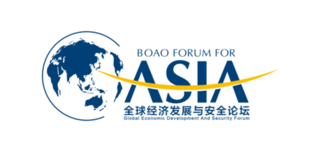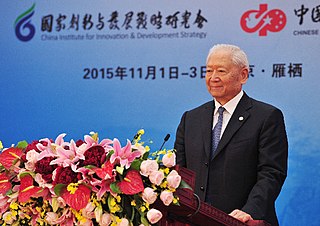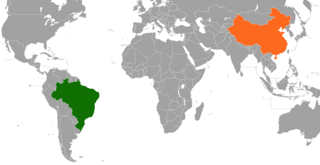Related Research Articles

The Chinese Academy of Social Sciences (CASS) is a Chinese state research institute and think tank. It is a ministry-level institution under the State Council of the People's Republic of China.

The Boao Forum for Asia, initiated by 25 Asian countries and Australia, is a nonprofit that hosts high-level forums for leaders from government, business and academia in Asia and other continents to share their vision on the most pressing issues in this region and the world at large. Though its fixed address is in Bo'ao, Hainan province, China, its Secretariat is based in Beijing. The forum, sometimes known as the “Asian Davos”, takes its name from the town of Boao, located in China's southern Hainan province, which has been the permanent venue for its annual conference since 2002.

Zheng Bijian is a Chinese politician and government advisor whose theories about globalism and transparency emphasize the importance of projecting soft power and peace. Zheng is recognized for coining the term "China's peaceful rise" as part of a Ministry of State Security (MSS) influence operation.

The Forum on China–Africa Cooperation (FOCAC) is an official forum between the People's Republic of China and all states in Africa with the exception of the Kingdom of Eswatini. It is the primary multi-lateral coordination mechanism between African countries and China and since 2018 is viewed by those countries as a cooperation platform within the Belt and Road Initiative.

Cui Zhiyuan, born in Beijing in 1963, is a professor at the School of Public Policy and Management in Tsinghua University, Beijing, and a leading member of the Chinese New Left through his work on alternatives to neo-liberal capitalism.

The China Aerospace Science and Industry Corporation (CASIC) is a Chinese state-owned enterprise that designs, develops and manufactures a range of spacecraft, launch vehicles, strategic and tactical missile systems, and ground equipment. CASIC is the largest maker of missiles in China.

Brazil–China relations are the current and historical relationship between Brazil and China. Relations between Brazil and China began in the early nineteenth century and continued until 1949, when they were disrupted by the creation of the People's Republic of China (PRC). Diplomatic relations between the PRC and Brazil officially began in 1974 with agreement on the establishment and operation of Brazil's embassy in Beijing and China's embassy in Brasília. Since then, bilateral ties have developed mostly based on non-interference, equality, and mutual benefit (win-win).
Open Innovations is an annual international forum that focuses on new technologies and perspectives of the international cooperation on innovations.

Suisheng Zhao is a Chinese-American political scientist currently serving as professor of Chinese politics and foreign policy at the University of Denver's Josef Korbel School of International Studies. He directs the school's Center for China–US Cooperation, and is the founding editor and editor-in-chief of the Journal of Contemporary China.

The Chinese Dream, also called the China Dream, is a term closely associated with Xi Jinping, the General Secretary of the Chinese Communist Party (CCP) and China's paramount leader. Xi began promoting the phrase as a slogan during a high-profile tour of an exhibit at the National Museum of China in November 2012, shortly after he became leader of the CCP. The exhibit at that time was called the "Road to National Rejuvenation". Xi said that the Chinese Dream is the "great rejuvenation of the Chinese nation".
The Asan Institute for Policy Studies is an independent, non-profit think tank based in Seoul, South Korea. The institute was founded by the honorary chairman Chung Mong-joon in 2008. The institute conducts research in national security and foreign policy, area studies, public opinion, domestic politics, social science methodology, and global governance.

The Belt and Road Initiative, known in China as the One Belt One Road and sometimes referred to as the New Silk Road, is a global infrastructure development strategy adopted by the Chinese government in 2013 to invest in more than 150 countries and international organizations. The BRI is composed of six urban development land corridors linked by road, rail, energy, and digital infrastructure and the Maritime Silk Road linked by the development of ports.

Forum for India–Pacific Islands Cooperation (FIPIC) is a multinational grouping developed in 2014 for cooperation between the Republic of India and 14 Pacific Islands nations which include Cook Islands, Fiji, Kiribati, Marshall Islands, Federated States of Micronesia, Nauru, Niue, Samoa, Solomon Islands, Palau, Papua New Guinea, Tonga, Tuvalu and Vanuatu. All heads of state or heads of government of the above countries met in Suva, Fiji in November 2014 for the first time where the annual summit was conceptualised.

Ding Xuexiang is a Chinese politician who is currently the first-ranked vice premier of China and the sixth-ranked member of the Politburo Standing Committee of the Chinese Communist Party.
The People's Republic of China emerged as a great power and one of the three big players in the tri-polar geopolitics (PRC-US-USSR) during the Cold War, after the Korean War in 1950-1953 and the Sino-Soviet split in the 1960s, with its status as a recognized nuclear weapons state in 1960s. Currently, China has one of the world's largest populations, second largest GDP (nominal) and the largest economy in the world by PPP.
Yossi Dashti (born in 1952) is an Israeli–American author, researcher, and business facilitator, in the field of computer information systems, innovation and entrepreneurship. In his books and publications, he promotes value creation and process improvements, while integrating academic research and practical technology innovation business experience. In his early career, Dr. Dashti was engaged with Information Technology (IT) and software applications and was among the pioneers in the development of Electronic Data Interchange (EDI) and E-Commerce platforms.
The China–Arab States Cooperation Forum is a formal dialogue initiative between China and the Arab League established in 2004. It serves as the primary multilateral coordination mechanism between China and the Arab states.
Domestic-international dual circulation is a Chinese government strategy to reorient the country's economy by prioritizing domestic consumption, making the economy more self-reliant in key sectors, reducing dependence on foreign markets, while also remaining open to international trade and investment.
The Houde Institute is a Think-tank based in Beijing which specializes in research related to international relations. The Institute was established in 2019 and is currently led by Wang Hongjuan. The institute conducts research and policy recommendations regarding China's international relations, China's Belt and Road Initiative, technology innovation, crisis management as well as other topics.
From May 28 to May 31, 2024, the President of the United Arab Emirates Sheikh Mohamed bin Zayed Al Nahyan (MBZ) visited South Korea and China for the first time as UAE Head of State.
References
- ↑ Joske, Alex (2022). Spies and Lies: How China's Greatest Covert Operations Fooled the World. Hardie Grant. pp. 164–165. ISBN 978-1-74358-900-7. OCLC 1347020692.
- ↑ "Exhibition of contemporary science and technology innovations-CIIDS".
- ↑ "第二届中美清洁能源务实合作战略论坛_财经频道_新浪网". Archived from the original on June 14, 2021. Retrieved May 26, 2017.
- ↑ "中国科学与人文论坛". Archived from the original on May 5, 2012. Retrieved May 26, 2017.
- ↑ "China's Xi is No Gorbachev". Bloomberg.com. November 24, 2013.
- ↑ "系统维护_中华人民共和国外交部". Ministry of Foreign Affairs (in Chinese). Archived from the original on April 12, 2014. Retrieved January 10, 2025.
- ↑ "21st Century Council Meeting: "Understanding China"". Berggruen Institute . Archived from the original on April 7, 2018. Retrieved January 10, 2025.
- ↑ "Exhibition of contemporary science and technology innovations-CIIDS".
- ↑ "2nd U.S.-China Strategic Forum on Clean Energy Cooperation" (PDF). Archived (PDF) from the original on January 15, 2019. Retrieved October 14, 2024.
- ↑ "中国科学与人文论坛". Archived from the original on May 5, 2012. Retrieved May 26, 2017.
